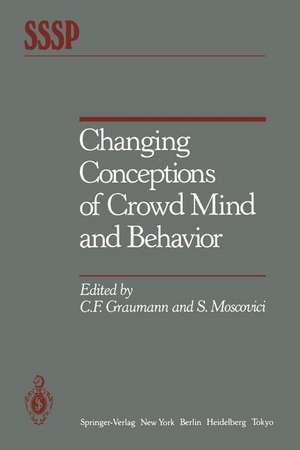Changing Conceptions of Crowd Mind and Behavior: Springer Series in Social Psychology
Editat de C. F. Graumann, S. Moscovicien Limba Engleză Paperback – oct 2011
Din seria Springer Series in Social Psychology
-
 Preț: 40.07 lei
Preț: 40.07 lei - 15%
 Preț: 643.48 lei
Preț: 643.48 lei -
 Preț: 387.96 lei
Preț: 387.96 lei -
 Preț: 384.48 lei
Preț: 384.48 lei -
 Preț: 386.00 lei
Preț: 386.00 lei - 15%
 Preț: 694.69 lei
Preț: 694.69 lei -
 Preț: 394.87 lei
Preț: 394.87 lei -
 Preț: 387.96 lei
Preț: 387.96 lei - 15%
 Preț: 642.36 lei
Preț: 642.36 lei -
 Preț: 389.31 lei
Preț: 389.31 lei - 15%
 Preț: 640.06 lei
Preț: 640.06 lei - 15%
 Preț: 696.02 lei
Preț: 696.02 lei - 18%
 Preț: 891.17 lei
Preț: 891.17 lei -
 Preț: 392.60 lei
Preț: 392.60 lei - 18%
 Preț: 889.60 lei
Preț: 889.60 lei -
 Preț: 382.18 lei
Preț: 382.18 lei -
 Preț: 387.75 lei
Preț: 387.75 lei -
 Preț: 388.90 lei
Preț: 388.90 lei -
 Preț: 384.48 lei
Preț: 384.48 lei - 18%
 Preț: 726.37 lei
Preț: 726.37 lei -
 Preț: 384.86 lei
Preț: 384.86 lei - 18%
 Preț: 779.57 lei
Preț: 779.57 lei -
 Preț: 380.07 lei
Preț: 380.07 lei -
 Preț: 387.20 lei
Preț: 387.20 lei -
 Preț: 392.60 lei
Preț: 392.60 lei - 18%
 Preț: 725.43 lei
Preț: 725.43 lei -
 Preț: 387.38 lei
Preț: 387.38 lei - 15%
 Preț: 640.71 lei
Preț: 640.71 lei - 18%
 Preț: 777.03 lei
Preț: 777.03 lei -
 Preț: 386.00 lei
Preț: 386.00 lei - 15%
 Preț: 639.73 lei
Preț: 639.73 lei -
 Preț: 382.18 lei
Preț: 382.18 lei -
 Preț: 390.25 lei
Preț: 390.25 lei - 18%
 Preț: 781.45 lei
Preț: 781.45 lei -
 Preț: 382.75 lei
Preț: 382.75 lei -
 Preț: 386.99 lei
Preț: 386.99 lei -
 Preț: 382.75 lei
Preț: 382.75 lei -
 Preț: 428.46 lei
Preț: 428.46 lei - 15%
 Preț: 533.72 lei
Preț: 533.72 lei -
 Preț: 388.52 lei
Preț: 388.52 lei -
 Preț: 393.13 lei
Preț: 393.13 lei -
 Preț: 389.11 lei
Preț: 389.11 lei -
 Preț: 387.75 lei
Preț: 387.75 lei
Preț: 386.22 lei
Nou
Puncte Express: 579
Preț estimativ în valută:
73.90€ • 77.37$ • 61.15£
73.90€ • 77.37$ • 61.15£
Carte tipărită la comandă
Livrare economică 07-21 aprilie
Preluare comenzi: 021 569.72.76
Specificații
ISBN-13: 9781461293330
ISBN-10: 1461293332
Pagini: 260
Ilustrații: XI, 241 p.
Dimensiuni: 155 x 235 x 14 mm
Greutate: 0.37 kg
Ediția:Softcover reprint of the original 1st ed. 1986
Editura: Springer
Colecția Springer
Seria Springer Series in Social Psychology
Locul publicării:New York, NY, United States
ISBN-10: 1461293332
Pagini: 260
Ilustrații: XI, 241 p.
Dimensiuni: 155 x 235 x 14 mm
Greutate: 0.37 kg
Ediția:Softcover reprint of the original 1st ed. 1986
Editura: Springer
Colecția Springer
Seria Springer Series in Social Psychology
Locul publicării:New York, NY, United States
Public țintă
ResearchCuprins
1. Introduction.- 2. The Discovery of the Masses.- A New Human Dimension: The Crowd.- How a Science Discovers Its Facts.- The Riddle of Crowd Formation.- A Science of the Irrational.- Crowds are the Unconscious.- Natural Crowds and Artificial Crowds.- 3. Models of Suggestive Influence and the Disqualification of the Social Crowd.- The Political and Intellectual Climate of Fin-de-Siècle Paris.- Disqualification and Revolution: The Perspective of the Crowd Psychologies.- From Medical to Psychiatric Praxis—From Animal Magnetism to Suggestive Influence.- Hypnosis Versus Suggestion—The Nancy/Salpêtrière Debate.- Binet at the Salpêtrière—Dogmatic Experimentation.- The Pervasiveness of the Hypnosis/Suggestion Model at the End of the 19th Century.- From Theories of Magnetism to Political Ideology.- From Suggestive Influence to Crowd Psychology.- Binet at the Crossroads of the Social Psychology of Interpersonal Influence.- Conclusion.- 4. Freud and Massenpsychologie.- 5. Mass Psychology, Social Psychology, and the Politics of Mussolini.- Brief Presentations.- Mussolini and the Three Authors.- Le Bon, Orano, and Sorel and the Sociopsychological Study of Mussolini’s Rise and Fall.- 6. The Social Psychology of William McDougall.- McDougall’s Two Volume Social Psychology.- Reaction to McDougall’s Social Psychology.- Postscript.- 7. The Individualization of the Social and the Desocialization of the Individual: Floyd H. Allport’s Contribution to Social Psychology.- Social Psychology as Individual Psychology.- The Individual Psychology of Crowds and Groups.- The Individualization of Social Psychology: An Evaluation in Retrospect.- 8. Conceptions of Crowds and Crowding.- Everyday Experiences of Crowds and Crowding.- The Unrelatedness of Crowds and Crowding inScientific Research and Discourse.- Crowd Psychology.- Crowding Phenomena and Research on Crowding.- The Janus-Faced Problem of Crowd and Crowding.- 9. Collective Behavior from the 17th to the 20th Century: Change of Phenomena, Change of Perception or No Change at All? Some Preliminary Reflections.- A Paradigm Change in Perception.- From “Revolts” to “Revolution”: The Continental World.- The Natural Law of Mass Action: The Anglo-Saxon World.- The Rebellious Subjects: Germany.- A Paradigm Change in Interpretation of Motivation: From Passions to Interests (17th-18th Centuries).- A Paradigm Change in Perceiving the “Laboring Poor” in England: From Low to High Wages as Incentive for Work.- The Laborer as “Working Animal” and the “Unpredictable Natural Forces” of Working Class Action: The German Kaiserreich.- Class Interests and Perception.- 10. Masses—From an Idealistic to a Materialistic Point of View? Aspects of Marxian Theory of the Class.- Social Movement as a Dialectical Process.- The Conflict Between Bauer and Marx.- Mass and Class.- 11. Mass, Mobilization, and the State.- Individual Action and Collective Movement.- 12. The Social Organization of Early Human Groups.- 13. Crowd Mind and Behavior: Afterthoughts.- The Historical Versus Scientific Approach to Mass Phenomena.- Top-Down Versus Bottom-Up Conceptions of Mass Phenomena.- The Rationalist Versus Irrationalist Explanations of Crowd Phenomena.- Author Index.







